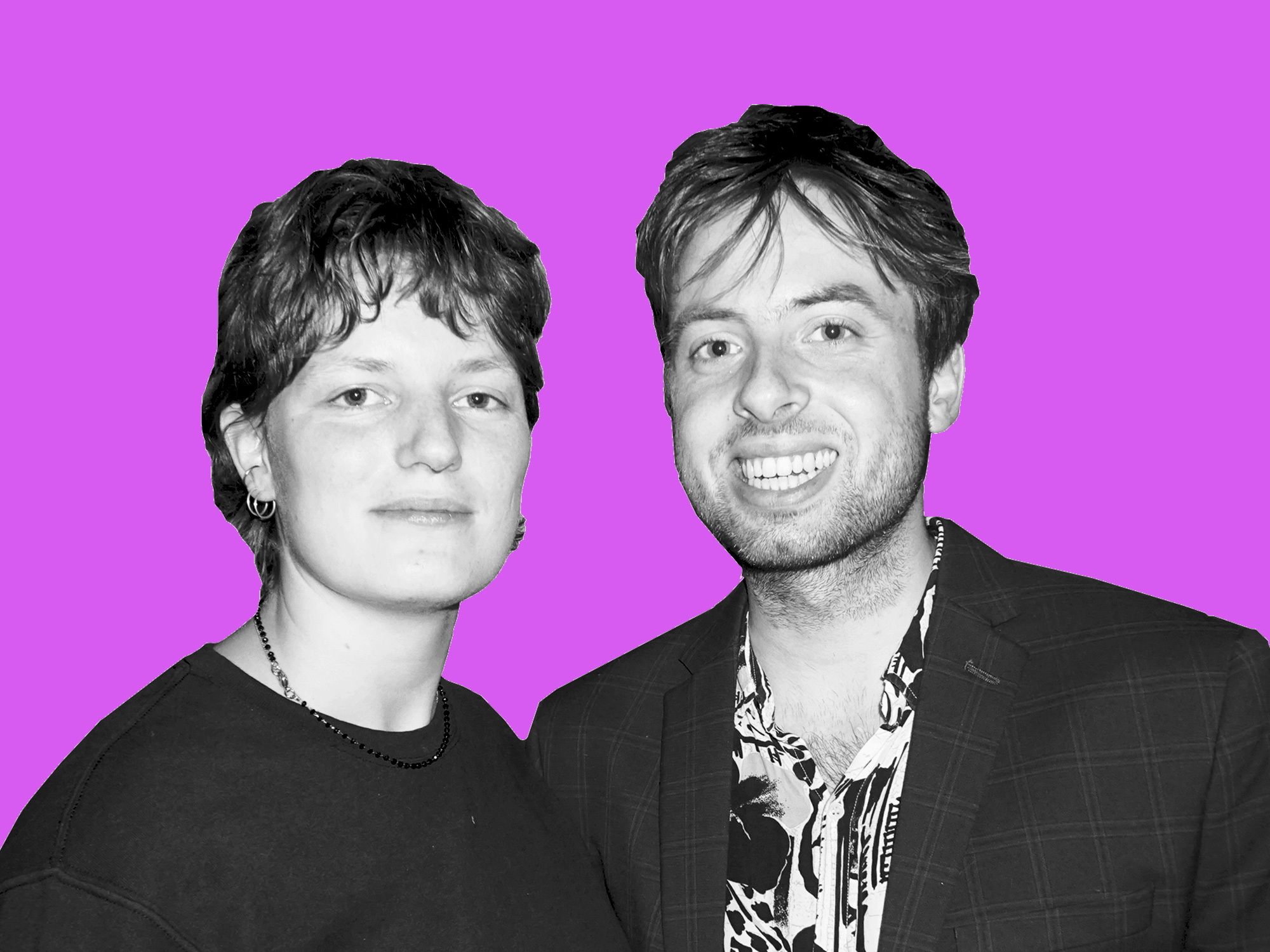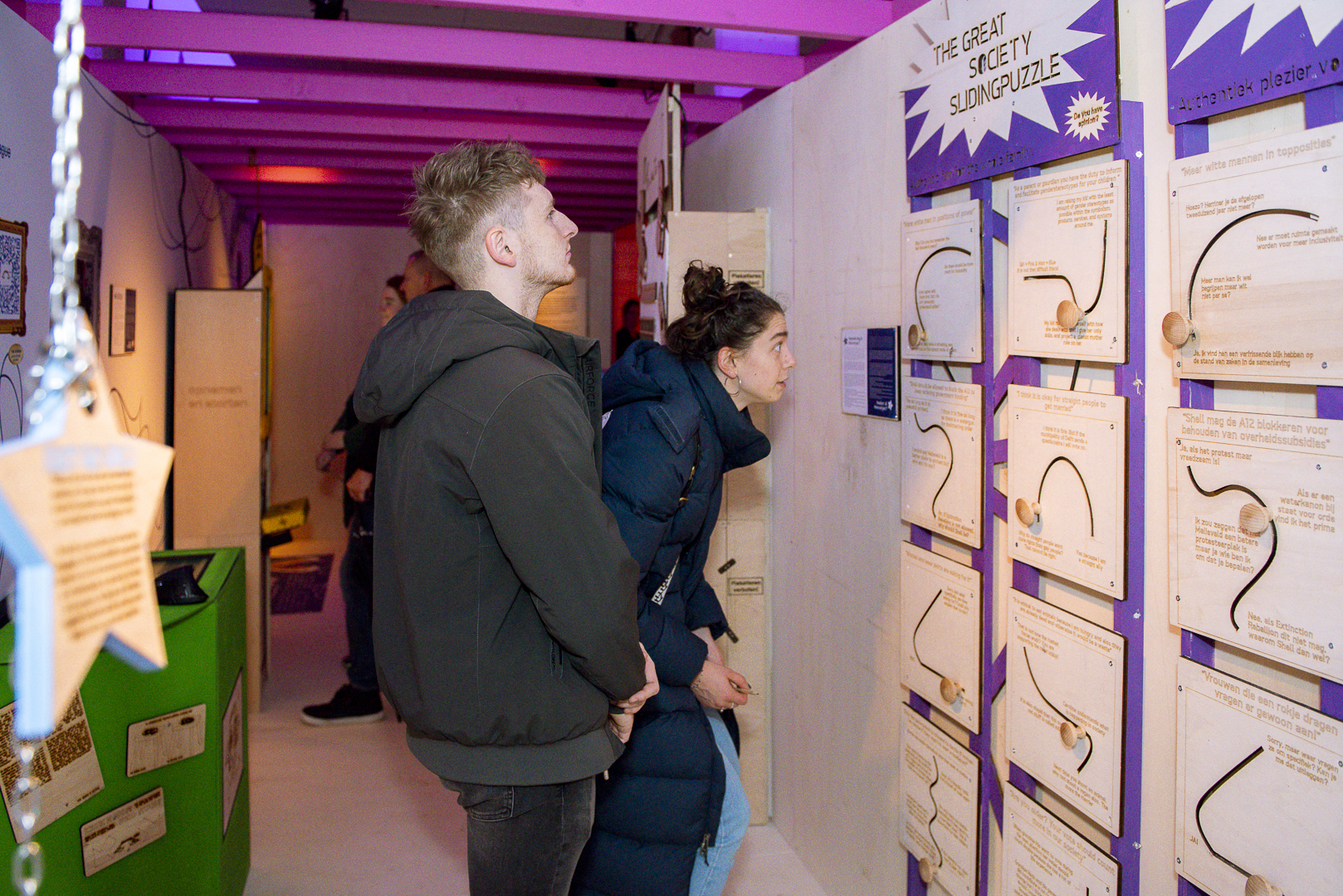Unconscious Bias
Are society & systems designed to fit you?
This installation holds up a mirror to society, with the idea of exclusion at the core. Each of us at some
point encounters a product that fails to match up to our mental ability, body shape or motor skills. In a
world in which we want our products to be more sustainable, wouldn’t it be cool if every product was fit for
every person? Unfortunately, the designed world is not ready for that yet, as many designers suffer from
the so-called 'self-user syndrome.' Also known as 'the product works perfectly... for me, so I don't need to
make any adjustments.' This continues to lead to products, services and systems that cannot be used by
various groups in society.
How do we change this? The installation is based on a theory by Joris Luyendijk. His ' 7 check marks’ theory suggests that there are seven aspects that determine how prosperous you will be in society. The student team transformed this theory into the '7-checkmarks-of-Design' theory. In a nutshell, this means there are seven aspects that determine to what extent real-world designs are tailored to the individual. These are aspects of daily life that we are not always aware of. Unfortunately, these facets are unconsciously (and sometimes consciously) not considered in design.
The seven interactions you can experience in this installation will ensure that even you - the average Dutch Design Week visitor - will be excluded. Suppose you are different from the average Dutch Design Week visitor - and thus do not possess all seven checkmarks of Design - there is a chance that you will be 'locked in' for the first time. How do we do that? You are invited to come and experience 'what design can do.’
How do we change this? The installation is based on a theory by Joris Luyendijk. His ' 7 check marks’ theory suggests that there are seven aspects that determine how prosperous you will be in society. The student team transformed this theory into the '7-checkmarks-of-Design' theory. In a nutshell, this means there are seven aspects that determine to what extent real-world designs are tailored to the individual. These are aspects of daily life that we are not always aware of. Unfortunately, these facets are unconsciously (and sometimes consciously) not considered in design.
The seven interactions you can experience in this installation will ensure that even you - the average Dutch Design Week visitor - will be excluded. Suppose you are different from the average Dutch Design Week visitor - and thus do not possess all seven checkmarks of Design - there is a chance that you will be 'locked in' for the first time. How do we do that? You are invited to come and experience 'what design can do.’
About the designers

We are marrenathan design, an avant-gardist design duo from Delft that does not necessarily make the
world more beautiful. Marre van der Schee (1998) and Nathan Douenburg (2001) met during their first
year at Industrial Design Engineering at TU Delft. Their first project during a course on design and
emotion was creating a stool. From this came the 'face stool,' a stool with a seat shaped like a human
face, where the main emotion the user should experience is 'misery.' This project set the tone for the rest
of this innovative collaboration.
The idea that design can sometimes be miserable is an important aspect of marrenathan design's work. This led to the concept for this exhibition: a world in which someone finally wonders, 'is the world actually designed for me?' The answer is probably not.
The motivation for this project stemmed from Nathan's experiences in life, having often come into contact with people with disabilities and limitations in his close circles. This made it difficult for him to consider the world as normal and 'for everyone.' Those who do not fit the norm often feel 'bad design' the most but are usually the ones who lack the means to correct it. His goal is to raise awareness among those who can make a difference, even if they may not be aware of it themselves yet.
Marre once decided to read a book about (in)equality and design, which changed her perspective on the world forever. Design is not neutral, and it's good to be mindful of this. Products and services intended for 'everyone' are often not usable by everyone. How do you approach this?
Together, Nathan and Marre form the foundation of marrenathan design. From a distance, the duo appears to be involved in performance art or an elaborate joke but the question "What design can do?" occupies them every day. "Innovate or die" is their motto, and together, they provide that refreshing perspective on the products, services, and systems around us.
The idea that design can sometimes be miserable is an important aspect of marrenathan design's work. This led to the concept for this exhibition: a world in which someone finally wonders, 'is the world actually designed for me?' The answer is probably not.
The motivation for this project stemmed from Nathan's experiences in life, having often come into contact with people with disabilities and limitations in his close circles. This made it difficult for him to consider the world as normal and 'for everyone.' Those who do not fit the norm often feel 'bad design' the most but are usually the ones who lack the means to correct it. His goal is to raise awareness among those who can make a difference, even if they may not be aware of it themselves yet.
Marre once decided to read a book about (in)equality and design, which changed her perspective on the world forever. Design is not neutral, and it's good to be mindful of this. Products and services intended for 'everyone' are often not usable by everyone. How do you approach this?
Together, Nathan and Marre form the foundation of marrenathan design. From a distance, the duo appears to be involved in performance art or an elaborate joke but the question "What design can do?" occupies them every day. "Innovate or die" is their motto, and together, they provide that refreshing perspective on the products, services, and systems around us.
What we do at TU Delft
Industrial Design Engineering?
Students and researchers are working to make a fairer, more inclusive society through courses
(for example Inclusive Design and Culture Sensitive Design) and through labs, including the
Inclusive Design Lab
and the
AI DeMoS Lab
. In graduation projects, students team up with
organisations and support groups to improve products and services for people with special
needs. Recently, an IDE graduate developed a
secure online payment system for blind users.




